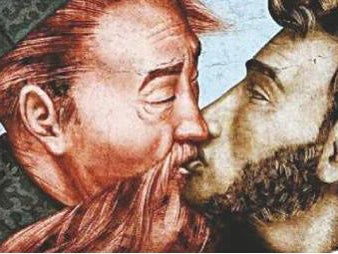Kazakhstan gay kiss poster hit with lawsuits
Human Rights Watch says 'homophobia masked as cultural concern' must not be allowed to triumph after lawsuits have been brought over a poster showing a same-sex kiss

Your support helps us to tell the story
From reproductive rights to climate change to Big Tech, The Independent is on the ground when the story is developing. Whether it's investigating the financials of Elon Musk's pro-Trump PAC or producing our latest documentary, 'The A Word', which shines a light on the American women fighting for reproductive rights, we know how important it is to parse out the facts from the messaging.
At such a critical moment in US history, we need reporters on the ground. Your donation allows us to keep sending journalists to speak to both sides of the story.
The Independent is trusted by Americans across the entire political spectrum. And unlike many other quality news outlets, we choose not to lock Americans out of our reporting and analysis with paywalls. We believe quality journalism should be available to everyone, paid for by those who can afford it.
Your support makes all the difference.A series of lawsuits have been brought over a poster showing a same-sex kiss in Kazakhstan.
The poster, created by an advertising agency, shows two significant historical figures kissing – the Kazakh composer Kurmangazy Sagyrbaiuly and the Russian poet, Aleksandr Pushkin.
Today, a judge in Almaty, the largest city in Kazakhstan, will begin initial proceedings in a case brought against the agency by 34 people who work at a national conservatoire and in an orchestra named after the famous 19th century Kazahk composer. The plaintiffs are seeking approximately US$186,000, (£115,000) in damages from the Havas Worldwide Kazakhstan advertising agency. The picture - and advert for a gay club - sparked controversy on social media after the agency posted it to Facebook on 24 August.
The human rights watchdog, Human Rights Watch, has now said that “respect for freedom of expression should lead to dismissal” of the lawsuits in a statement.
“The poster is no doubt provocative, but provocation is a legitimate part of freedom of expression and arguably an inherent part of creative design,” said Mihra Rittman, the Europe and Central Asia researcher for Human Rights Watch.
“Kazakhastan’s judiciary should ensure that freedom of expression trumps subjective discomfort about a particular image, and that homophobia masked as cultural concern is not allowed to triumph,” Rittman said.
The poster was designed for the Central Asian Advertisement Festival where it won an award in August. The picture references the intersection of the Kurmangazy and Pushkin streets in Almaty, which is also where the gay club, Studio 69, can be found. One of the artists involved, Valery Volodin, wrote on Facebook: “One can be proud of this work. First of all because it works: people understand and remember the address. Secondly, it is a brave work, and in the case of the gay movement, traditionally living on the edge, it is more than accurate and justified," EurasiaNet reported.
The plaintiffs say that the poster is “unethical” and offensive not only to the “honour and dignity of the composer’s and poet’s descendants, but to all people not indifferent to their art.”
In early September local media reported that Nurken Khalykbergen, who claims to be a descendant of the composer, has also filed a lawsuit for “moral damages” of about US$55,000.
After the social media stir was caused by the poster the country’s Bolashak (Future) national movement organised a roundtable against homosexuality. The movement’s leader called for Kazakhstan lawmakers to criminalise LGBT “propaganda.” A statement which Human Rights Watch has also criticised saying: “Kazakh officials should firmly reject any attempts to introduce such legislation.”
Join our commenting forum
Join thought-provoking conversations, follow other Independent readers and see their replies
Comments